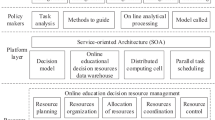Abstract
In the era of big data, the traditional distance learning method cannot effectively distinguish the weight of each course attribute, ignoring the recognition process of knowledge cognition law in higher education institutions. In order to better study the learning motivation, learning effect, and cognitive process of distance learners, a chaos optimization cognitive learning model based on chaos optimization and big data analysis is designed in this paper. The proposed model takes into account the learners’ learning motivation, learning task demands, and the change rate of cognitive rules and transforms the learning process of distance learning into a multi-objective optimization problem. The experimental results show that the proposed model can effectively improve the teaching quality of distance education courses in higher education institutions, and the model is scalable and compatible.









Similar content being viewed by others
References
McGreal R, Anderson T (2007) E-learning in Canada. Int J Distance Educ Technol 5(1):1–5
Chen C, Wang Y, Li C, Zhang Y, Xing C (2014) Big data research and application of the online education field. Dev Appl Comput 51(1):61–74
Feng D, Zhang M, Li H (2014) Big data security and privacy protection. J Comput Sci 37(1):246–258
Lu J (2013) Big data and its application in education. Shanghai Educ Res 13(9):5–8
Zhu Rongbo, Zhang Xue, Liu Xiaozhu, Shu Wanneng, Mao Tengyue, Jalaeian Brian (2015) ERDT: energy-efficient reliable decision transmission for cooperative spectrum sensing in industrial IoT. IEEE Access 3(2):2366–2378
Lin F, Zhou X, Zeng W (2016) Sparse online learning for collaborative filtering. Int J Comput Commun Control 11(2):248–258
Li Y, Shu LC, Zhu R, Li L (2017) Distributed air index for efficient spatial query processing in road sensor networks on the air. Int J Commun Syst 30(5):1–23
Lin F, Xiahou J, Xu Z (2016) TCM clinic records data mining approaches based on weighted-LDA and multi-relationship LDA model. Multimed Tools Appl 75(22):14203–14232
Lin F, Zeng J, Lin S, Zeng W, Lv H (2017) Multi-objective evolutionary algorithm based on non-dominated sorting and bidirectional local search for big data. IEEE Trans Ind Inform 13(4):1979–1988
Alfonso Q, Clematis A, Galizia A, D’Agostino D (2013) Hybrid Clouds brokering: business opportunities, QoS and energy-saving issues. Simul Model Pract Theory 39(3):121–134
Zheng H, Tang C, Xu K et al (2010) Chaotic iterative functions for heterogeneous population mining based on co evolution. J Comput Sci 33(4):672–685
Heng-Hui Chen (2009) Chaos synchronization between two different chaotic systems via nonlinear feedback control. Nonlinear Anal Theory Methods Appl 70(12):4393–4401
Yuan X, Yuan Y, Wang C, Zhang Y (2006) A novel self-adaptive chaotic genetic algorithm. Acta Electron Sin 34(4):708–712
Yao JF, Mei C, Peng XQ (2002) The application research of the chaos genetic algorithm and its evaluation of optimization efficiency. Acta Autom Sin 28(6):935–943
Deming L (1999) A hybrid genetic algorithm using chaos for globally optimal solution. Syst Eng Electron 21(12):81–82
Huang C, Jieshi Z (2004) Chaos updating rotated gates quantum-inspired genetic algorithm. In: IEEE Proceedings on Communication, Circuits and System. UESTC Press, Chengdu, pp 1108–1112
Fei C, Han Z (2006) An improved chaotic optimization algorithm. Control Theory Appl 23(3):471–474
Upadhyay RK (2009) Dynamics of an ecological model living on the edge of chaos. Appl Math Comput 210(2):455–464
Rodero-Merino L, Vaquero L, Gil V, Galan F, Fontan J, Montero R, Llorente I (2010) From infrastructure delivery to service management in clouds. Future Gener Comput Syst 26(8):1226–1240
Acknowledgements
This work was supported by Ministry of Education Project of Humanities and Social Sciences in China (Grant No.17YJAZH120), Education and Teaching Method project in Central University of Finance and Economics (Grant No.040950317001), the foundation for Key Research Items in Teaching Reform Program of Central University of Finance and Economics (Grant No. JG201610) and the Key Research Grant of School of Foreign Studies of Central University of Finance and Economics (Grant No. 20141010), and the National Science Foundation of China (Grant No. 61603420). We wish to thank the anonymous reviewers who helped to improve the quality of the paper.
Author information
Authors and Affiliations
Corresponding author
Rights and permissions
About this article
Cite this article
Wen, J., Zhang, W. & Shu, W. A cognitive learning model in distance education of higher education institutions based on chaos optimization in big data environment. J Supercomput 75, 719–731 (2019). https://doi.org/10.1007/s11227-018-2256-2
Published:
Issue Date:
DOI: https://doi.org/10.1007/s11227-018-2256-2




